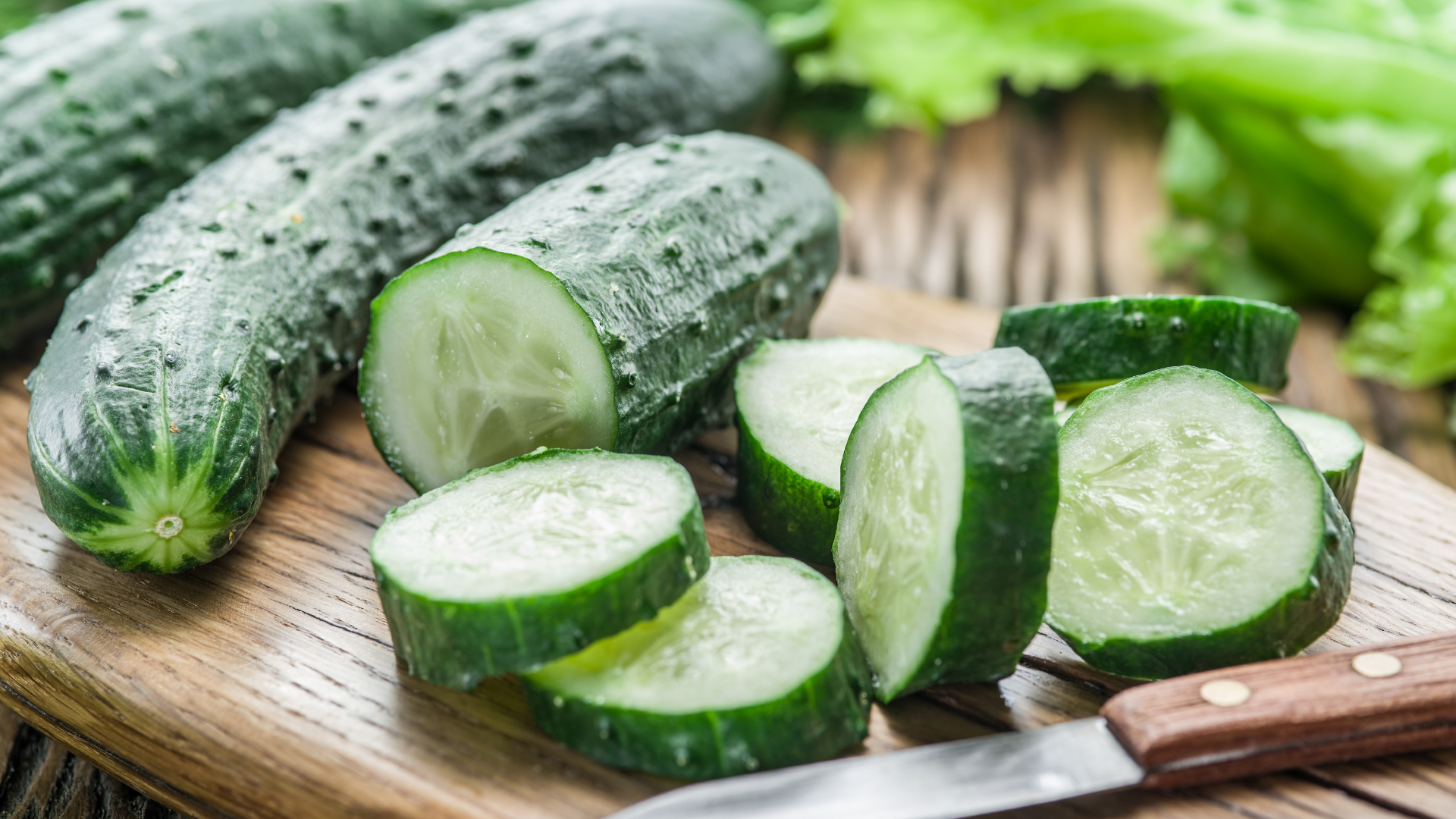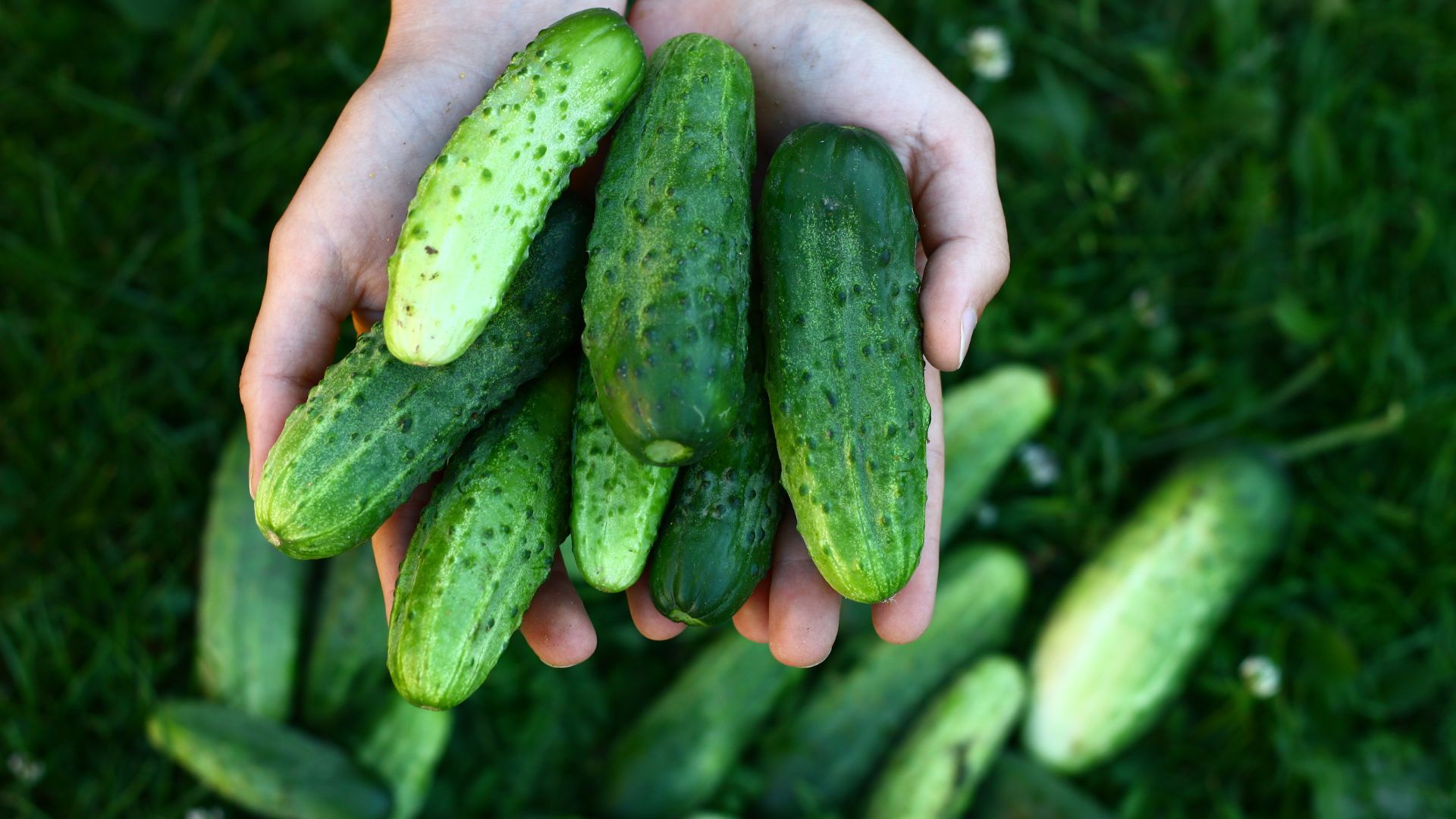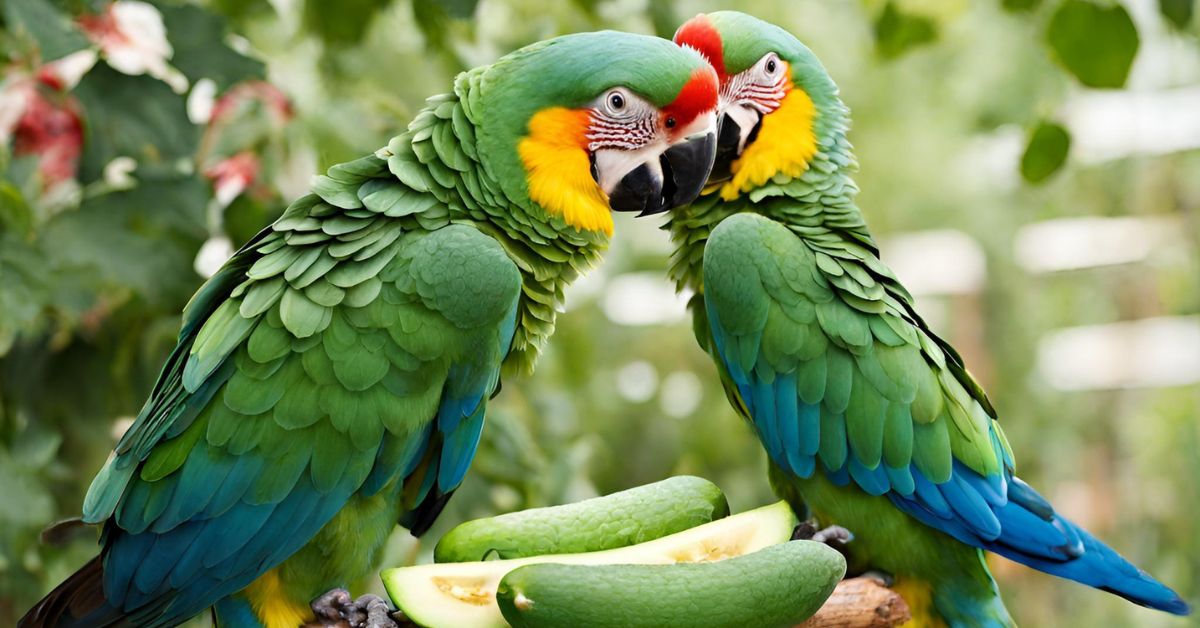Yes, They can, without a doubt. In reality, parrots enjoy snacking on cucumbers every once in a while. Parrots can munch on cucumbers, including skins and seeds.
These crunchy treats are not only a hydration boost but also a trove of nutrients, packed with vitamins A, C, and B6, and essential minerals.
Cucumbers are great for keeping your parrot’s immune system robust and may even enhance their vision in low-light conditions. So, feel free to let your feathered pals enjoy this refreshing snack!

What’s cucumber?
A cucumber is a widely cultivated plant in the gourd family, Cucurbitaceae. It’s technically a fruit, though many treat it as a vegetable due to its culinary uses.
Cucumbers are known for their long, slender, green-skinned fruits with mild, crisp flesh. They’re often eaten fresh or pickled and are common in salads, sandwiches, and various culinary dishes.
Cucumbers are composed mostly of water, making them a refreshing food, especially during warm weather.
They also contain various nutrients, such as vitamins A, C, and K, and have a modest amount of minerals like potassium and magnesium.
Additionally, cucumbers have a low-calorie content, which makes them a popular choice for people looking for light, healthy eating options.
Nutritional Value of Cucumbers for Parrots.

In addition to being low in calories and packed with fiber and other beneficial minerals, cucumbers are also a good source of water.
Cucumbers are an exceptionally nutritious treat for parrots, but because they don’t have a lot of carbohydrates or proteins, they can’t take the place of the parrots’ regular food.
A 100-gram slice (about one-third) of a cucumber isn’t just a mere 15 calories; it’s also a source of about 3.5% of the daily recommended intake of vitamin A for parrots, not to mention doses of vitamins C, E, K, and B6, along with several minerals and a hint of calcium.
- Vitamin A isn’t just crucial for various metabolic functions; it’s a game-changer for parrots’ vision, particularly in low light or shadowy environments. It plays a significant role in reproductive health, immune response, and overall growth in parrots.
- Vitamin C acts as an antioxidant powerhouse, essential for tissue growth, blood vessel health, and a multitude of bodily functions, including a robust immune system.
- Vitamin B6 is a key player in nervous system metabolism and immune function.
Moreover, cucumbers gift parrots essential minerals necessary for the optimal functioning of their bones, muscles, heart, and brain.
Can Parrots Eat Cucumber Peels?

Yes, parrots can eat the peels of cucumbers. These skins are full of fiber and vitamin A, which are good for your parrot’s eyesight and stomach, especially when there isn’t much light.
Because of what they normally eat, parrots can handle the tough texture of cucumber leaves.
If the leaves of cucumbers aren’t too tough, parrots can happily nibble on them.
But it’s important to wash the cucumbers well to get rid of any leftovers or germs that might be on them.
If you think the peels are too rough for your parrots, you may find them thrown away in their cage or play area.
After washing and slicing the cucumbers well, hang them in your parrot’s cage to make a fun and healthy pecking treat.
How to Feed Cucumbers to Your Parrots.

If you want to give your parrots cucumbers, you should only give them fresh, fully-grown cucumbers. They’re not only better for their health, but they also taste better for your birds.
For your parrots, it’s best to cut the cucumbers into small pieces that they can handle. You could give your birds a whole cucumber, but bite-sized pieces will make it easy for them to handle and eat.
You’re making your parrots a cool cucumber treat that tastes a lot like a salad and adds variety to their diet.
This is especially helpful when the weather gets hot because it gives your parrots a snack that will keep them hydrated.
Parrots usually don’t mind trying cucumbers, but it’s important to watch them as they eat them for the first few times. If they leave any food behind that they haven’t eaten, it’s important to get rid of it right away to keep their living area clean and keep pests out.
When Should Parrots Avoid Cucumbers?

Cucumbers are typically a safe bet provided they’re clean and clear of pesticides and mold. Only offer your parrot cucumbers that are fresh and fit for your consumption.
Steer clear of cucumbers showing yellow patches, depressed areas, or those with shriveled, overripe ends.
Mold is a definite no-go. It’s perilous for parrots, disrupting their digestive system and potentially leading to hazardous infections.
Also, it’s prudent to avoid feeding them elongated strips of cucumber peels.
Parrots, lacking teeth, don’t chew their food in the traditional sense.
Lengthy, thin strips could potentially cause difficulties.
Parrots can enjoy cucumbers both raw and cooked, but be cautious with cucumber salads, especially those mixed with dressings or ingredients harmful to parrots, such as onions.
Other Leafy Greens That Are Great for Parrots.
So you’re looking into different foods for your parrots, right? You might want to turn a part of your house into a green haven.
Growing your herbs and vegetables is not only a good way to save money, but it also guarantees a fresh harvest every time.
Also, so that you know, don’t leave your parrots in the yard alone.
They’re not known for being calm, so your green space could quickly become a feathered party!
What’s the deal? Gather and give by hand. This way keeps your plants safe and keeps your birds from eating too much.
Bonus: your parrots could be the secret tool you need to fight the never-ending weed invasion. If you let them play in the yard while you watch, they’ll eat those green invaders.
Just ensure that none of the plants are poisonous to your bird friends. It is natural, good for the environment, and brilliant!
Let’s get this straight: greens for parrots are like dessert toppings — they’re delightful but shouldn’t exceed 10% of their total food intake.
Now, let’s uncover the vegetable and herb bonanza that parrots find irresistible:
Vegetables:
Herbs:
-
- Parsley
- Basil
- Oregano
- Mint
- Cilantro
Off-Limits: Foods Parrots Should Steer Clear Of
- Chocolate – As heart-wrenching as it may be, chocolate is off the menu for parrots. Compounds like theobromine and caffeine are the culprits here, and they lurk in tea, coffee, and fizzy drinks too. And remember, the darker the chocolate, the more potent the peril.
- Salty/Fatty Foods – If it’s something you’d guiltily devour during a late-night movie marathon, chances are it’s bad for your parrot. Fast food, junk food, processed delights — they’re all health hazards for your feathered companions.
Moldy Foods – While penicillin was a great discovery, not all molds follow suit. Foods flirting with decay and sporting moldy coats can spell serious trouble for parrots. And this isn’t just about your leftovers; their feed needs scrutiny too.
In the culinary world of parrots, these items are akin to forbidden fruit. Steering clear of these dangers ensures your parrot remains a happy, healthy member of your family.
Remember, when in doubt — opt out!
In Summary – Can Parrots Eat Cucumber?
Treats like cucumbers can be a fun and efficient way to improve your parrot’s diet. It’s also a great way to get to know your feathery friends better and interact with them.
It also aids in making sure they get a wide variety of nutrients every day.
Parrots can benefit from these goodies, but only if you give them to them in moderation and at regular intervals.

